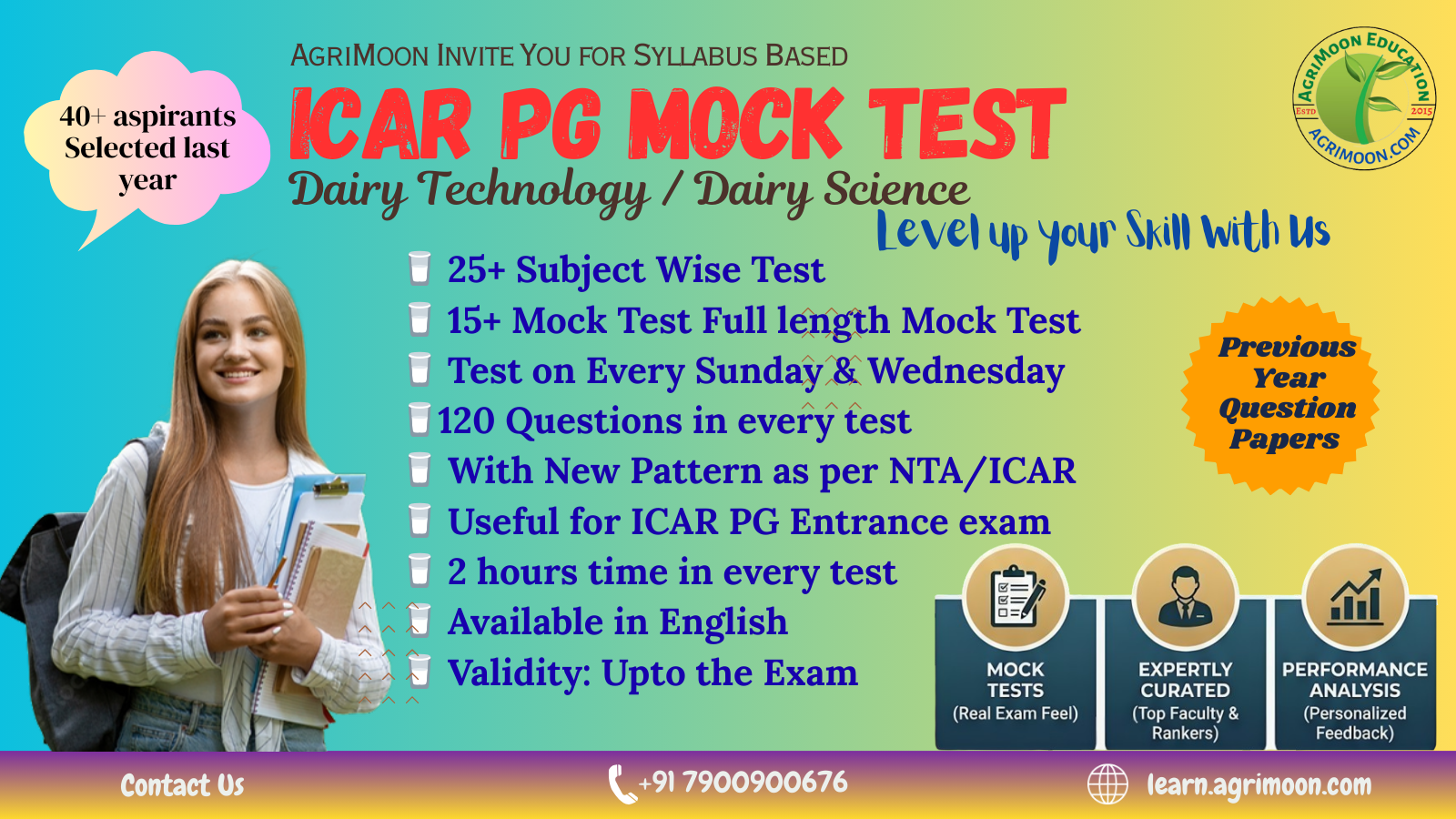Code 01: MAJOR SUBJECT GROUP – PLANT BIOTECHNOLOGY
(Sub-Subjects: 1.1: Plant Biochemistry/ Bio. Chem. 1.2: Plant Biotechnology & Molecular Biology/Biotechnology,
1.3: Plant /Crop Physiology)
UNIT-I: Importance of agriculture in national economy; basic principles of crop production; cultivation of rice, wheat, chickpea, pigeon-pea, sugarcane, groundnut, tomato, and mango. Major soils of India; role of NPK and their deficiency symptoms. General structure and function of cell organelles; mitosis and meiosis; Mendelian genetics. Elementary knowledge of growth, development, photosynthesis, respiration and transpiration; Elements of economic botany. General structure and function of carbohydrates, proteins, nucleic acids, enzymes and vitamins. Major pests and diseases of rice, wheat, cotton, chickpea, sugarcane and their management. Organic farming; bio-fertilizers; bio-pesticides. Recombinant DNA technology; transgenic crops. Important rural development programmes in India; organizational set up of agricultural research, education and extension in India. Elements of statistics.
UNIT-II: Importance of biochemistry in agriculture. Acid-base concept and buffers; pH. Classification, structure and metabolic functions of carbohydrates, lipids and proteins. Structure and function of nucleic acids. Enzymes: structure, nomenclature, mechanism of action; vitamins and minerals as coenzymes and cofactors. Metabolic pathways: glycolysis, TCA cycle, fatty acid oxidation, triglyceride biosynthesis. Electron transport chain; ATP formation. Photosynthesis: C-3, C-4 and CAM pathways. Nitrate assimilation; biological nitrogen fixation. Colorimetric and chromatographic techniques
Also Read: ICAR Exam Syllabus For All PG
UNIT-III: Characteristics of prokaryotic and eukaryotic organisms; differences between fungi, bacteria, mycoplasms and viruses. Physical and chemical basis of heredity; chromosome structure. DNA replication, transcription and translation; genetic code; operon concept. Genetic engineering; restriction enzymes; vectors; gene cloning; gene transfer. Plant cell and tissue culture; micro-propagation; somaclonal variation. Transformation; recombination; Heterosis. General application of biotechnology. Molecular and immunological techniques. Concept of bioinformatics, genomics and proteomics.
UNIT-IV: Plant Physiology/ Crop Physiology: Plant physiology– importance in agriculture. Seed germination, viability and vigour. Photosynthesis- significance of C-3, C-4 and CAM pathway; photorespiration and its implications. Translocation of assimilates; dry matter partitioning; Harvest index of crops. Growth and development; growth analysis; crop-water relationship. Plant nutrients and their functions. Phytohormones and their physiological role. Photo-periodism, vernalisation; pollination/ fertilization in flowering plants. Post-harvest physiology and its significance.
Code 02: MAJOR SUBJECT GROUP – PLANT SCIENCES
(Sub-Subjects: 2.1: Plant Breeding & Genetics, 2.2: Plant Pathology, 2.3: Agricultural Microbiology/Microbiology,
2.4: Seed Science & Technology, 2.5: Plant Genetic Resources)
UNIT-I: Importance of Agriculture in national economy; basic principles of crop production; cultivation of rice, wheat, chickpea, pigeon-pea, sugarcane, groundnut, tomato, potato and mango. Major soils of India, role of NPK and their deficiency symptoms.
UNIT-II: Structure and function of cell organelles; mitosis and meiosis; Mendelian genetics; elementary knowledge of photosynthesis; respiration, and transpiration; structure and functions of carbohydrates, proteins, nucleic acids, enzymes and vitamins. Major pests and diseases of rice, wheat, cotton, chickpea, sugarcane and their management.
UNIT-III: Characteristics of prokaryotic and eukaryotic organisms, differences between fungi, bacteria, mycoplasmas and viruses; physical and chemical basis of heredity; chromosome structure; genes/operon concept; protein biosynthesis; transformation, recombination, Heterosis; Elements of economic botany; integrated diseases management; sterilisation, disinfection and pasteurization; Koch’s postulates; etiological agents of rusts, smuts, powdery/downy mildews, wilts, yellows, mosaic, necrosis, enations, blights and witches- broom; pH, buffer, vitamins, role of plant hormones in seed germination and dormancy; pollination/ fertilization in flowering plants; methods of seed testing; breeders, foundation and certified seeds; seed production in self and cross pollinated crops, nitrate assimilation; biological nitrogen fixation and other uses of microorganisms in agriculture.
UNIT-IV: Food and industry; composting and biogas production. Important rural development programmes in India; organizational set up of agricultural research, education and extension in India.
For Daily Update follow us at:
Facebook Telegram Whatsapp Instagram YouTube
If you are facing any Problem than fill form Contact Us or send Mail at info@agrimoon.com



[…] Source link […]
informative
[…] Click Here […]